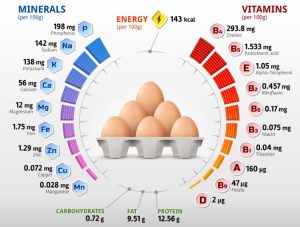Eggs, like some other foods, have gotten a bit of a bad rap over the years, with numerous findings reporting that eggs can be chiefly responsible for high levels of cholesterol.
However, the truth of the matter is altogether different. In fact, not only is the cholesterol statement erroneous, eggs actually have many varied — and essential — benefits for your body.
Because the average large egg contains between 180 and 186 milligrams of cholesterol, just one immediately counts for over half of your recommended daily intake, the Huffington Post reports.
However, it’s a little more complicated than that: It turns out cholesterol is actually already being produced, in rather significant amounts, by your body – 1 to 2 grams each day on average. But when you consume foods that contain cholesterol, your body’s production of the substance decreases to make up for it. You don’t really add cholesterol to existing amounts, you’re replacing one kind with another.
Authority Nutrition makes another excellent point: While cholesterol has negative connotations for obvious reasons, it is not a purely harmful molecule. Cholesterol is a vital part of the body, and is essential in creating testosterone, estrogen and cortisol. The website also reports a study where a group of individuals took to eating one to three whole eggs a day. For 70 percent of those people, eggs did not negatively affect cholesterol levels. For the remaining 30 percent, the issue was fairly benign as well: Eggs were found to change LDL cholesterol (the harmful variety) from small, dense molecules to larger ones, which made them a lot less of a threat. One damper on the good news, however: Eggs are found to cause an increased risk of heart disease in diabetics, Authority Nutrition says.
Now that we’ve dispelled most of the negative preconceptions about eggs, let’s explore the advantages to their regular consumption:

Eggs are rich in several different types of nutrients, according to the Huffington Post: They’re rich in vitamins A, D, E and B-12, as well as iron, folate, calcium, and omega-3 fatty acids, among others, all of which are extremely important.
